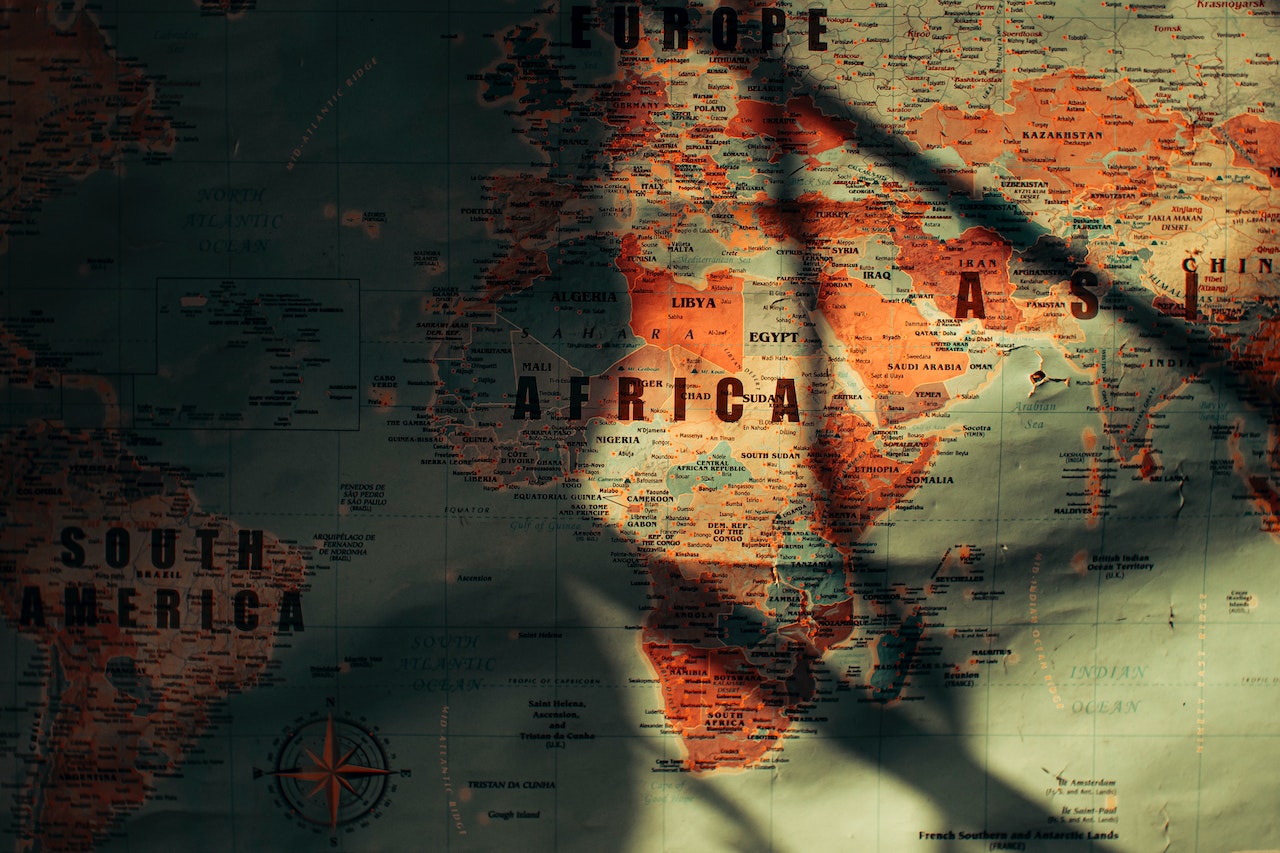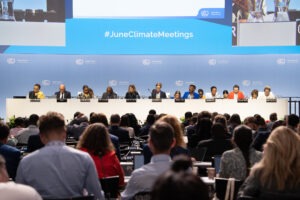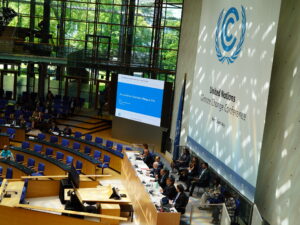From 4 to 8 September, international climate diplomacy – African governments, institutions and civil society – will meet in Nairobi for the Africa Climate Week and the Africa Climate Summit 2023. Meetings that have the stated goal of reaching a common position for African countries at COP28 which will be held in Dubai in December.
The Presidentof Kenya,William Ruto of Kenya, in statements ahead of the summits, clarified the priorities and objectives of these meetings and Africa’s expectations of global actors. African countries want to be seen as equal partners in the fight against climate change and demand that the international financial system be adapted to support the continent’s energy transition goals.
The vision is to enable Africa to develop by skipping the ‘fossil’ phase of industrialisation and focusing on energy production from renewable sources. Such development is only possible through adequate financial instruments, which are functional to foster growth and the electrification of the economy of African countries. For this reason, the Kenyan president is pressing for climate finance to be at the centre of the debate at the Nairobi summit.
Until now, the foreign policy in Africa of the major Western countries, especially the former colonial powers, has often been criticised, described as ‘paternalistic’ or ‘neocolonialist’ by many African countries, some of them characterised by great instability. Western countries are therefore called upon to redefine their approach, and the Nairobi summit is an important opportunity to understand and respond to the continent’s real needs in terms of economic development and energy.
The issue of development in Africa naturally has a transcontinental dimension, and the current Italian government has made it a priority. In fact, the development of the continent will be among the top items of the Italian G7 presidency’s agenda and is at the basis of a series of initiatives launched by the government, such as the ‘Rome Process’ and the ‘Mattei Plan’ that will be presented at the next Italy-Africa summit in November. If Italy wants to present credible proposals for a renewed Italian-African cooperation, it will therefore be important to pay due attention to the Nairobi meetings.
The links between climate change and poverty
It is well established that the effects of climate change disproportionately affect the most fragile countries and the most vulnerable communities. Subsistence or traditional agriculture is more vulnerable to damage from droughts or floods, and the lack of effective resources, infrastructure and institutions makes post-disaster reconstruction more difficult. These problems are particularly acute in Africa, a continent that, according to UN classification, includes 33 of the world’s 46 least developed countries. As the effects of climate change worsen, according to the most recent UN forecasts (WMO and IPCC, among others), it is estimated that in Africa alone, some 700 million people will be forced to leave their homes between now and 2030, thus becoming ‘climate migrants’. The effects of these migrations will not be limited to the national or geographical borders of the continent but will affect all neighbouring areas, including of course the shores of the Mediterranean. The link between climate, migration and security is discussed in detail in our recent publication. For these reasons, it is imperative that the international community take action to cooperate in the implementation of ambitious mitigation and adaptation projects in Africa.
Untapped renewable potential
The renewables potential in Africa is very high but largely ignored. Estimates by the International Energy Agency (IEA) show that Africa has, globally, about 60% of the most suitable areas for electricity production from photovoltaics. However, only 1% of the installed photovoltaic capacity is in Africa.
Africa remains an area whose foreign investments in the energy sector still almost exclusively concern fossil fuels, even though already 12 African countries, accounting for about 40 per cent of the continent’s emissions, have adopted a strategy of decarbonisation and zero emissions by the middle of this century. These are not wishful declarations: according to a 2030 scenario proposed by the IEA, 80% of the new capacity on the continent could be renewable, with the same amount of investments currently planned in fossil fuels. By way of example, with the simple reallocation of the capital initially planned by Chinese investors alone for the development of coal-fired power plants (before Beijing decided in 2021 to stop financing this technology abroad), a large part of the photovoltaic power envisaged by the scenario could be financed. In the IEA scenario, which has already occurred in 2022 due to the energy price crisis, in most cases the construction of renewable power plants would be more competitive than the development of fossil fuels, including natural gas.
The false promise of fossil resources development
The production and export of hydrocarbons has experienced great development in the past decades, and has been boosted in recently by the energy crisis following the Russian invasion of Ukraine. Several African countries have concluded trade agreements with European partners, Italy in primis, to replace Russian gas with African gas, delivered to Europe via Mediterranean pipelines or by ship in the form of LNG. However, these trade relations, touted as the foundation for shared prosperity, are based on traditional North-South dynamics that have often been described as ‘predatory’. The presence of large international oil companies has allowed Africa to produce and export large quantities of hydrocarbons, without any benefit to the local population of the wealth created. On the contrary, in several producing countries, and with a significant presence of Western companies, revenues and royalties from gas and oil have often fed corruption and cronyism and reinforced inequality and social injustice. One need only think of Nigeria, the leading African oil exporter, where around 40 per cent of the population still lives without access to electricity; or Mozambique, where gas development has not brought the expected economic benefits, but has often generatied conflict, corruption and economic distortions. In these countries, a phenomenon known as the ‘resource curse’ often occurs, whereby increased indebtedness, corruption and instability are the consequence of large oil and gas discoveries, even before production has started.
Even if a fairer redistribution of revenues from oil and gas production were to be implemented, there is a high probability that the economies of producing countries would remain victims of fossil resources export dependency. In addition to the inherent fragility due to national economies tied to a highly variable budget component, investments in infrastructure for the production and distribution of hydrocarbons may becoming stranded assets, and thus unsustainable, in a relatively short time. The IEA’s medium-term scenarios point to a significant slowdown in global demand for natural gas and oil at the end of the current decade, not least because of the decarbonisation targets of the world’s largest economies. It is therefore necessary for the growth of African countries to be based on a sustainable model of development, with a more solid foundation that is economically viable in the long run.
The limits of existing financial instruments and institutions
The instruments made available by the international community also need to be improved. From many voices – NGOs but also institutional actors – criticism rains down both on their form and substance. Not even the Just Energy Transition Partnerships (JETPs), which are financed by the most advanced economies, multilateral financial institutions and private partners (mainly banking groups), are exempt from criticism. For project development, JETPs include social, health, economic, climate and environmental criteria and, due to their broad scope, represent the main instrument for development cooperation based on energy transition. Among the criticisms levelled at JETPs, the main one concerns the nature of the financing, which often takes the form of loans, thus risking adding to an already unsustainable public debt burden for many African countries.
Even in terms of substance, the levels of investment in sustainable development projects are still far below the continent’s needs: in 2022, they amounted to less than $30B, just over 10% of the real needs, estimated at $280B. It is international private finance that shows little receptiveness to the continent’s sustainable development opportunities, while it continues to invest in new fossil projects following traditional natural resource exploitation schemes. In 2021, less than 1% of the $434B invested in renewables worldwide was dedicated to the African continent.
This unsustainable development model continues to have a great influence on African decision-makers. As several hundred African civil society associations have pointed out, there is a risk that the African Climate Summit will re-propose tools and ideas that are considered ‘fake solutions’, such as international greenhouse gas emission markets or geo-engineering projects, which allow large Western companies to continue their polluting activities, to the detriment of the continent’s real needs. Under the slogan ‘Make the Africa Climate Summit African’, African civil society demands that in Nairobi policy makers and economic actors move towards a sustainable growth model based on renewable energy and circularity.
Green growth as a beacon for Italy’s strategy for Africa
Relations between Italy and its African partners have a strong energy component, linked to the historical presence of the national oil company ENI in various regions, such as North Africa or West Africa. In view of the criticalities associated with a development model for Africa based on the exploitation of fossil fuels, it is appropriate for Italy to take advantage of its capacity for political and economic projection to respond to the requests and proposals that will be formulated at the Nairobi summit and that have already been partly anticipated by Kenyan President Rufo in recent months, also in light of the criticisms raised against the global financial architecture.
With the signing last July of the Memorandum with Tunisia, which provides for a special fund for the development of renewable energies, Italy has demonstrated that it is a serious and reliable interlocutor and mediator for Africa. The text of the agreement officially cements the link between migrations and the need for sustainable economic development that relies on renewable energies, untied from the exploitation of hydrocarbons.
Italy can provide Africa with considerable contribution both in financial terms – by redirecting guarantees and export credits to renewable projects – and in terms of know-how, relying on the experience and technologies of national public and private organisations.
Prime Minister Giorgia Meloni’s statements at the conference on migration and development organised by the Italian government last July in Rome show Italy’s willingness to act as an equal partner with African countries for growth and sustainable development. Upcoming major international events such as the COP28 in Dubai and, above all, the Italian presidency of the G7 2024 will give it the chance to do so concretely.







